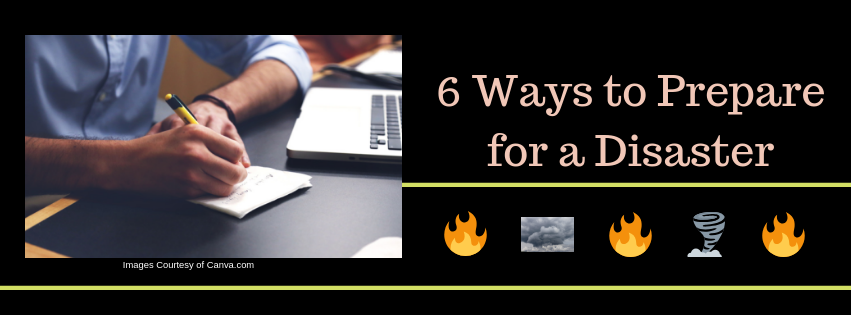Not too long ago we brought you an article describing the 6 principles every business should have to survive the aftermath of a crisis… but what about being prepared for the crisis itself?
Here are another 6 tips to help protect your company in the face of a disaster.
1) Make a Plan
While most people and businesses have safety protocols in place like evacuation routes, emergency supplies, and first aid kits, few think about rescuing records, tax information, and other important documents until it’s too late.
Make a detailed emergency plan that includes where important data is stored, what to grab first in accordance to the amount of response time you have, and what steps to follow before, during, and after a disaster.
2) Keep Copies of Important Documents
While important original documents like bank statements, deeds, titles, tax records, and insurance policies should always be kept in secure, waterproof – or even fireproof – containers, the IRS recommends making additional copies of each and storing them someplace safe, off-site.
Even by scanning documents electronically to keep on the cloud, or in a device, can help protect your business if there’s no time to retrieve any important data stored inside the workplace.
3) Record What You Own
To help aid in insurance claims after a disaster, the IRS recommends businesses take detailed pictures or walk-through videos of their workplace and all that’s inside – with an emphasized focus on all high-value items.
This photographic proof of ownership smoothens the claim process, while businesses can further compile lists of belongings by following IRS Publication 584-B.
4) Check with Your Payroll Providers
If you or your client’s business outsource their payroll to a third party, it’s a good idea to call and confirm that the provider has a fiduciary bond to protect your business in the event the payroll provider defaults. This applies to companies who withhold money from you and deposit into their own bank account prior to making tax deposits. If taxes are paid directly to tax agencies, your payments are made as reflected on your bank statements.
5) Have Updated Contact Information
While a list of client numbers and emergency contacts for employees is always good to have, often left out is the equally-helpful contact information for insurance providers, landlords, electricians, plumbers, and anyone else you might have to call in the aftermath of a disaster.
If the crisis is a federally declared disaster, businesses should call (866) 562-5227 to talk to an IRS disaster specialist, or retrieve tax transcripts through this link or by calling (800) 908-9946.
6) Confirm Backups Work
Last but not least, all business files, systems, and software should always be regularly backed up and stored in an off-site, secure location. It’s even recommended that those backups be stored in a separate part of the country!
But more than that, you should be checking that those backups work.
Take the steps. Protect your business, your clients, and your employees by being prepared for whatever may come.
